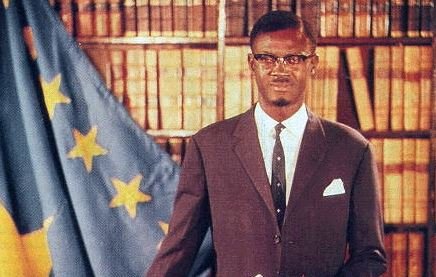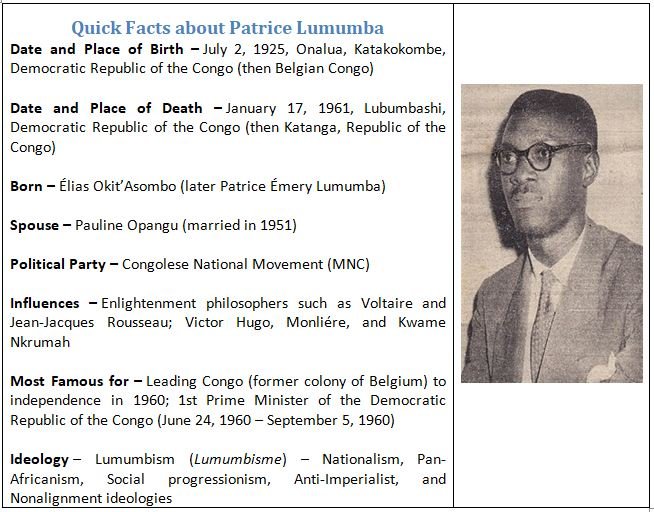Patrice Lumumba: Who was he, and what were some of his accomplishments?

Patrice Lumumba Accomplishments
Patrice Lumumba was a Congolese politician, pan-Africanist, social activist and independence fighter who devoted his entire life to gain Congolese independence from Belgium. Lumumba went on to become the first Prime Minister of an independent Democratic Republic of the Congo (formerly Belgian Congo). He served in that position for few months before he was brutally assassinated by Kantagese forces (under the leadership of Moise Tshombe) with ties to Army Chief of Staff Mobutu Sese Seko and the Belgian authorities.
To fully understand who Patrice Lumumba was, as well as his contributions to Congo and the African continent at large, here is a quick look at 10 major accomplishments of Patrice Lumumba.
Achievements of Patrice Lumumba

Patrice Lumumba facts
Head of the Congolese National Movement (MNC)
Known in French as the Mouvement National Congolais, the MNC was established in October 1958. Patrice Lumumba was one of the most influential founders of the MNC. It came as no surprise when the party members appointed him to lead and steer the affairs of party.
The party prided itself as a truly Congolese nationalist party, drawing members from all walks of life in the Congo. Due to its ethnic base-free ideologies, the MNC became very popular in the country. Influenced by the kind of political mobilization carried out by Ghana’s Nkrumah, Lumumba made sure that MNC steered clear of ethnic and regional politics.
Campaigned for a Political and Economic Independent Congo
Lumumba and the MNC used its nation-wide network to campaign for the independence of the nation. They called on all Congolese to support a system that would put Congolese firmly in charge of their own affairs. The MNC also pushed for more Congolese to be involved in the economic activities in order to properly reap the benefits of vast rich mineral resources of the country.
Right from the formative years of the MNC, Lumumba had always maintained that Congo’s future lay in the hands of Congolese themselves. He and the MNC refused aligning themselves to neither the West nor the Communist East.
His Africanist and nationalist ideologies earned enormous praises from the Congolese people as well other African statesmen. Thus he was seen as someone who had the interest of Congo at heart.

Attended the All-African Peoples’ Conference in Ghana
In December 1958, Ghana’s first Prime Minister Kwame Nkrumah (later first president of Ghana) organized the All-African People’ Conference in Accra, Ghana. Nkrumah invited a host of pan-Africanist and freedom fighters from all parts of the continent, including Hastings Banda of Malawi and Kenneth Kaunda. Leading the Congolese delegation was Patrice Lumumba. The young leader of the MNC had taken quite a liking to Nkrumah’s ideas on African unity and black power.
The Accra Conference was extremely beneficial to Lumumba. He had the opportunity to interact with and learn a lot from Africans that were making huge waves in the struggle for the complete decolonization of Africa. Lumumba’s charisma, fine-tuned oratory skills and well-spoken ideas were very much appreciated by the delegates at the conference, including Nkrumah.
Read More:
- Top 10 African Leaders of All Time
- Biography and Accomplishments of Ahmed Ben Bella, Algeria’s First President
Participated in the anti-colonial demonstration in Stanleyville
Patrice Lumumba and a number of high-ranking members from the MNC featured actively in the Stanleyville anti-colonial demonstration in 1959. A demonstration that started relatively peaceful gradually inched into utter chaos. The Belgian colonial government excessive use of force made matters worse. Riots broke out, claiming the lives of about 30 people as Brussels accused Patrice Lumumba and his MNC of unlawful acts. Lumumba was arrested and tried in January 1960. The anti-colonial activist was slapped with a 69-month prison sentence. His sentencing was met with further agitations from anti-colonial Congolese activists.
Led the MNC to win the December 1959 local election

Patrice Lumumba accomplishments
Belgium had hoped that the sentencing of Lumumba would result in the Congolese independence movement losing some steam. On the contrary, that did not happen. This was evident in the 1959 local elections that saw the MNC win convincingly. Many historians believe that although he was imprisoned, the anti-colonial icon had a hand in guiding the MNC to victory that year.
Attended the Brussels Conference of 1960
When it had become very obvious that Lumumba’s continuous imprisonment was bound to stir trouble in the Congo, the Belgium colonial authorities set Lumumba free in 1960. That same year, the Belgo-Congolese Round Table Conference was held in Brussels. Lumumba was one of the political delegates invited to Brussels Conference, which included opinion leaders and chiefs from the various parts of the Congo as well Belgian business and political leaders.
Lumumba, representing the MNC, worked behind the scenes to bring together the various Congolese political parties* in attendance. The conference ended with the adoption of sixteen resolutions that laid the road map for Congo’s independence.
Patrice Lumumba’s activism (along with support from political activists such as Joseph Kasa-Vubu (first president of the Congo), Moise Tshombe and Jean Bolikango) had finally paid off. Delegates at the conference selected June 30, 1960 as the date for the Congo’s independence. It was also agreed that a national election would be held in May 1960.
Life and Major Accomplishments of Ben Enwonwu, One of Africa’s Greatest Contemporary Artists
Formed the first coalition government in Congo
After a stellar performance by the MNC in the May 1960 national election, Lumumba was appointed by Ganshof van der Meersch (then Belgian Minister of African Affairs) to be informateur – a person who assessed the prospects of forming a unity government.
Owing to a host of difficulties, Lumumba struggled to attain a general consensus from the various political parties. The job of informateur moved to Kasa-Vubu who also failed get a compromise from the parties. Ultimately, Lumumba succeeded on his second attempt. Towards the tail end of June 1960, Lumumba announced that he had compiled a list of the various members that would make up the national unity government. The list had 37 members from different ethnic groups in Congo. Not wanting to leave any key stakeholder out, Lumumba purposely chose people from diverse educational backgrounds and political beliefs to make up his government.
First Prime Minister and Defense Minister of the Congo
On June 23, 1960, deputies met at the Chamber of Deputies (Palaise de la Nation). The deputies appointed Joseph Kasa-Vubu as head of state (i.e. the first president of the Congo) while Lumumba was elected to the Prime Minister’s position. He was also appointed to head the defense ministry.
There were some members of parliament that were opposed to Lumumba holding the premier and the defense minister positions. This opposition primarily came from Katangese deputies (from the semi-autonomous State of Katanga).
On the final day of voting for the confirmation of Lumumba’s government, 57 members of parliament refused attending. Regardless, Lumumba was still able to secure 74 votes in favor. In the Senate, 60 voted in favor of Lumumba’s government. Thus Lumumba, 34 at the time, became the first prime minister of the independent Democratic Republic of the Congo.

Excepts from Lumumba’s fiery speech on Independence Day, June 30, 1960
He pushed for unity and Africanization of the country
In a speech prior to his election as the Premier of the Congo, Lumumba called on his government to at all times maintain a neutralist policy underpinned by national unity. Lumumba refused to align the country to neither the West nor the East. He believed that the Congo was capable of charting its own path devoid of foreign machinations and influences. His anti-colonial and positive neutralism rhetoric roused suspicion in Brussels.
On Independence Day, June 30, 1960, Lumumba gave a fiery speech that announced to the nation that Congo was not going to be a puppet to old colonial masters or the West. He wanted the independence of the Congo to be felt in every nook and cranny of the nation.
He fought hard to stamp out tribalism and regionalism in the Congo
Patrice Lumumba sought to emulate the system of governance used by Kwame Nkrumah at the time, a government that was truly devoid of ethnicity and regionalism. He also floated the idea of bringing the various political parties under an umbrella national party. He hoped that the national party would allow for quicker decision-making process, which would ultimately spur economic growth in the Congo.

How did Patrice Lumumba die?
A few months into the premiership of Lumumba, tensions flared in the semi-autonomous State of Katanga, marking the beginning of the Congo Crisis. Mutinies from various sections of the Congolese army caused clashes to erupt between Lumumba’s government and President Kasa-Vubu. Ultimately, the Chief of Staff of the Army Mobutu Sese Seko stepped in and overthrew Lumumba’s government on September 5, 1960.
On December 1, 1960, Lumumba’s convoy was intercepted in Lodi as it made its way to Deputy Prime Minister Antoine Gizenga in Stanleyville. The deposed head of government was locked up while Congolese politicians and Belgian authorities discussed his fate.
Under instructions of Belgian authorities and mild complacency (tacit approval) from the United States, the separatist State of Katanga killed Patrice Lumumba by firing squad. Declassified documents indicate that Lumumba’s assassination was conducted under the supervision of Belgian officers in Katanga on 17 January 1960.
Prior to Lumumba’s assassination, there were even plots by the Central Intelligence Agency (CIA) to murder or facilitate the murder the Lumumba. The U.S. government at the time feared that Lumumba was moving too fast into the arms of the Soviets.
Read More:
Patrice Lumumba’s Legacy

Patrice Lumumba accomplishments
As prime minister, Patrice Lumumba worked very hard to improve the lives of Congolese. He sought to create a national identity in his country. He reasoned that the only way to attain that was to remove all colonial ideologies and structures from the Congo. His legacy lies in the fact that he at all times he embodied the principles of equality, social justice and economic liberty.
His assassination, abhorrent as it was, only further enhanced his ideas (Lumumbism) and appeal across the Congo, becoming a global icon and martyr for not just Pan-Africanism but for the American civil rights movement of the 1950s and 1960s.
*Parti du Peuple(PP), Parti du Peuple (PP), Alliance des Bakongo (ABAKO), Confédération des associations tribales du Katanga (CONAKAT), Parti Solidaire Africain (PSA)




























An insightful history. Kudos